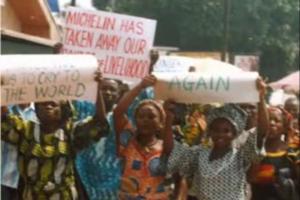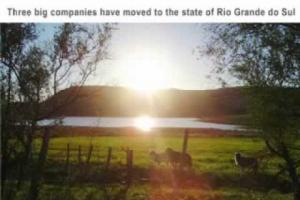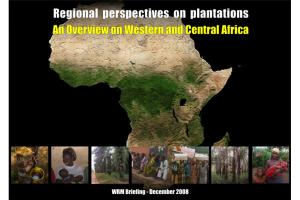In November 2009, 117 Nigerian organisations signed on to a statement to the government with a challenging message: leave oil in the ground. They expressed they were “united in our opposition to new oil blocs and call on all progressive-minded peoples and organizations to support our call that new oil finds be left in the ground and bitumen left in the soil.”
Nigeria
Bulletin articles
29 June 2009
On June 9 Environmental Rights Action/Friends of the Earth, Nigeria (ERA/FoEN) has released a press statement describing the outcome of the landmark suit instituted by Ken Saro Wiwa Jr and other Ogonis accusing Shell of complicity in the execution of author and human rights activist Ken Saro-Wiwa and other Ogoni leaders in 1995, among other human rights abuses, as a significant milestone in the search for justice in the bloody oil fields of the Niger Delta.
Bulletin articles
30 March 2009
“I don’t want money. I want my land back…if they give me one million Naira [the local currency] today, I will still go broke, but if I have my land I can always farm to take care of my family and possibly pass the land on to my children.”(Woman from Iguoriakhi)
Other information
30 March 2009
If after reading the above articles you (as a woman within an organization, as a member of a women’s movement, as an activist on human rights issues, as an environmentalist, as a journalist, as a member of a consumer’s association, as a campaigner on climate issues, trade issues, health issues, etc) are wondering what you can do to start making changes to the current situation, we have some ideas that we hope may be of use.
Multimedia
11 March 2009
By the World Rainforest Movement and Forest and Biodiversity Program of Friends of the Earth International
Other information
30 January 2009
Did you ever imagine that the tyres of your car may have been produced at the expense of a local community’s livelihood in Nigeria?
Most of the world natural rubber production goes for the manufacturing of tyres for different types of vehicles, ranging from cars, to trucks, airplanes and so on. To have an idea of the huge amount of tyres consumed, let’s take a look at the statistics in 2007 where 1.3 billion tires were produced.
Publications
15 December 2008
Oil palm and rubber plantations occupy extensive areas in many countries in tropical Africa. In spite of their social and environmental impacts, until now they have received scant attention both at the national and international level.
Bulletin articles
25 November 2008
Nigeria holds 11,700 square kilometers of mangrove forest: the third largest in the world and the largest in Africa. Most of this mangrove is found in the Niger Delta.
Nigeria is also a major oil producer and most oil extraction takes place in the Niger Delta. There, petroleum or crude oil abounds in rock formations. The complex mixture of hydrocarbons and other organic compounds that make up the flammable liquid fossil fuel is extracted from oil wells found in those oil fields.
Bulletin articles
24 March 2007
We had already shared (see WRM's bulletin Nº 111) what the ‘Operation Climate Change’ -- launched on January 1, 1999 -- did in the Niger Delta: activists shut down oil flow stations and gas flares. In response, many houses were destroyed, people were killed and women were raped. However, the struggle continued and mainly women started a joint campaign to protect life by putting a stop to the depredations of Big Oil. They won a fight: in January 2006 Nigerian courts ordered Shell to stop the flaring of natural gas in Ogoniland.
Bulletin articles
30 October 2006
A thorough report by Leigh Brownhill and Terisa E. Turner (“Climate Change and Nigerian Women’s Gift to Humanity”) traces Nigerian resistance to massive oil exploitation --which has not rendered any good for the country’s people (see WRM Bulletin Nº 56) -- and highlights women’s leading role in that struggle.
Bulletin articles
6 May 2006
The political instabilities in Nigeria during Abacha's regime in 1993/94, which was an aftermath of the annulment of June 12, 1992 presidential election won by the late business mogul -Chief M.K.O. Abiola- created an acute scarcity of kerosene that was seriously felt in different parts of the country. The kerosene scarcity led to the invention of “Abacha Coal-Pot” – a locally made cooking stove that uses charcoal.
Bulletin articles
7 April 2006
The Omo Forest Reserve –located in the South west of Nigeria- was legally constituted as a forest reserve by Order No. 10 of 1925 and the Order was amended in 1952. The forest was practically unexplored by then. The forest was ceded to Government for reservation on the 8th of October, 1918. The agreement was made between the District Officer, Ijebu Ode on behalf of the British Colonial government and the Awujale of Ijebu Ode on behalf of the Ijebu Native administration.



